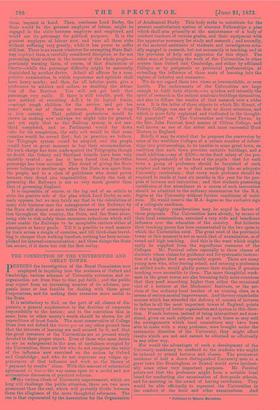LORD DERBY ON STATE RAILWAYS.
LORD DERBY has given a serious blow to a hope which has brought his party many friends,—a hope that the State, by absorbing the Railways, may find means to make them more useful to the people, while reducing permanently
the National Debt. With his usual obstructive common- sense, he has placed in the strongest light every obstacle to the change, and omitted every advantage to be derived from it ; and though he admits, as usual, that if the people desire it, it can be done—" Them air my sentiments, gentlemen ; but, gentlemen, if you do not like them, they can be changed " —he is evidently afraid of so vast and complicated a pro- posal. That point of his argument we admit at once. The change is vast, involving the creation of a Depart- ment a fraction heavier than the Admiralty, and compli- cations nearly as great as those which perplex the Horse Guards. But we entirely deny that the remainder of Lord Derby's dozen of propositions are so irrefragable as the public of Liverpool appear to believe. We do not, for instance, apprehend that the cost price of purchase would be exaggerated, as Lord Derby thinks. The purchase of the Telegraphs was a small affair, managed by great capitalists, with, most unfortu- nately, Lord Salisbury, the most extreme advocate of pro- perty rights in England, for an arbitrator ; but the purchase of the Railways would be a great matter, in which the Government would be compelled to appeal directly to the people, and if de- feated by the Railway oligarchs, would submit price as well as measure to the people on the hustings. The price being visibly fair—say, for instance, the price fixed by the Railway Acts, plus ten per cent. for forced sale—the vote would crush the intriguers once for all. The Railways think themselves very strong, but it is only the shareholders who in such a measure would be assailed, all other holders, whether of pre- ference shares or debentures, being immensely benefited by the sale. Our own impression is not fear lest the electors should resist, but fear lest they should press on the change too rapidly, as they are beginning to do in America, and de- mand reductions too rapid and severe. Then as to State management being bad, it is the merest fallacy. A State de- partment whose business it is to spend works badly very often, but a State department whose business it is to get money never does. Our Treasury is only too harsh. No complaints are ever made of failures in the French Treasury. Our Post Office is a miracle of gpod management, as is the Indian monopoly of Opium. We never have grand muddles in the Customs, nor will the Board of Trade rule their traffic-managers worse than the Admiralty rules the Navy. As to the possibility of Rail- ways being superseded—a touch of imagination with which Lord Derby lightens his statistics—Government can take pos- session of anything that supersedes them, or it can make its loan dependent on their not being superseded. Lord Derby himself ran that risk when he consented to guarantee the Railways of India. If investors believe in Railway property while managed by the men they are, why disbelieve in them while managed by men whose good faith is obviously reckoned higher. But, says Lord Derby, a serious fall in Railway business would be coincident with a serious fall in other business, and then the State would be oppressed. Not a bit of it. Profits would be less, and there would be less reduction of the National Debt for a year or two ; but there would be an end of the mischief. Of course, if the State is to have no margin, if it is not to make a profit, and a huge one, there might be such danger ; but we agree with Mr. Galt and the late Mr. Graves that State management would involve from the beginning very great profit, which at the end of three years would have such an effect on the National Debt that the interest of the State, of the taxpayers, and of the consol-holder would be directly and visibly involved in the new system. It is possible that England is nearing her zenith, and will speedily decline, but no argument stronger than that could be used for a great attack upon the National Debt, which will never be seriously reduced out of direct taxation. As to the desire to use the sponge being increased by the State ownership of the Rail- ways, it would be directly diminished, for in the event of any such spirit springing up, the Railway profits could be used to keep down taxation. As to this nation of traders giving up the power of borrowing for any temporary advantage—for that is what repudiation means—it must previously have changed its character to an extent which makes it useless to speculate. That under conceivable circumstances the English would display their true character, as a desperate and slightly unscrupulous people, with a touch of the old Berserkar strain in them, is probable enough, but they will attack a good many things before they enter upon a course of national spoliation. It may be quite true that the national indebtedness of Europe is increasing ; but the chance of repudiation is de- creased, not increased, by the number of holders of the debts. The owners of French Rentes, if attacked, could now defend
them, bayonet in hand. Then, continues Lord Derby, the State would be the greatest employer of labour, might be engaged in the strife between employer and employed, and would use its patronage for political purposes. It is the greatest employer of labour now, and runs all these risks without suffering very greatly, while it has power to suffer still less. There is no reason whatever for exempting State Rail- way employe's from a carefully considered discipline, or for not preventing their strikes in the interest of the whole people— previously warning them, of course, of that diminution of liberty—while the patronage difficulty might be materially diminished by another device. Admit all officers by a com- petitive examination, in which experience and aptitude shall have heavy marks ; and then, for all inferior posts, give a preference to soldiers and sailors, so doubling the attrac- tion of the Services. You will not get back that patronage very easily. If there is still trouble, push the new method of recruiting A.B.'s to its logical limits, —accept rough children for the service, and get ten years' work out of them in return. Boys are a drug in this country. That political preferences would be shown in making new railways we might take for granted, and yet reply that as the Railway system is not one- third completed, and as Parliament would lay down rules for its completion, the only evil would be that some counties would be served first ; but in practice, we believe, the Telegraph system would be adopted, and the people would have in great measure to buy their accommodation. No such charge has been made against the Telegraphs, though no doubt the Orkney and Shetland Islands have been very shabbily treated ; nor has it been found that Post-Office patronage has been misused. This dread of giving the State power belongs to another age, when the State was apart from the people, and to a class of politicians who dread power because they dread also responsibility. Surely the task of governing the Railways is not so very much greater than that of governing England.
It is impossible, of course, at the fag end of an article to state the positive side of the plan which Lord Derby so seri- ously opposes, but we may fairly say that in the calculation of many able business men the management of the Railways by the State will almost at once treble the means of communica- tion throughout the country, the State, and the State alone, being able to risk safely those enormous reductions which will alone enable the Railways to be acceptable carriers either of passengers or heavy goods. Till it is possible to send manure by train across a couple of counties, and till third-class travel- ling is cheaper than walking barefoot, nothing has been accom- plished for internal communication ; and those things the State can secure, if it dares but risk the first outlay.



































 Previous page
Previous page